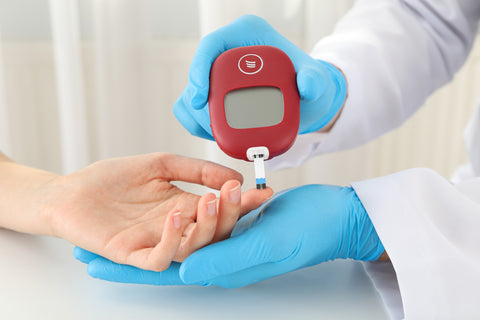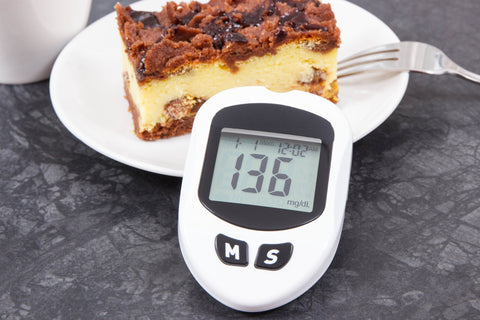Understanding How Blood Sugar Impacts Metabolism

🎧 On the go? Learn more about blood sugar and metabolism on The GOOD IDEA Audio Blog, available on Spotify or Apple Podcasts.
Understanding the intricacies of our body's functioning is like reading the blueprint of life itself. In the domain of health and fitness, the nexus between blood sugar and metabolism holds particular significance.
For health enthusiasts and especially those managing diabetes mellitus, grasping the intimate connection between blood sugar and metabolism can foster an informed approach to staying fit, energetic, and healthy. Most importantly, it can help you reach glucose homeostasis (a state when you aren't experiencing dramatic spikes in your blood glucose).
Read along as we dive into the depths of these concepts, aiming to understand not only the individual roles of our metabolism and blood sugar but also the potent interplay that governs our physiology.
Understanding Blood Sugar
Before we can appreciate its relationship with metabolism, we must first understand what blood sugar is, as well as its implications for our health.
Definition and Normal Range
Blood sugar concentration is the amount of glucose present in the blood. The hormone insulin helps to regulate blood sugar levels, ensuring that it stays within a normal range.
According to Mount Sinai, fasting blood glucose levels between 70 and 100 mg/dL (3.9 and 5.6 mmol/L) are considered normal.
Your doctor can have you take one or more of the following blood tests to measure blood sugar:
Fasting Blood Sugar Test
After fasting overnight (not eating), this test measures your blood sugar levels. Diabetes is defined by a fasting blood sugar level of 126 mg/dL or higher, while prediabetes is defined as a level of 100 to 125 mg/dL.
Glucose Tolerance Test
After drinking a glucose-containing liquid, this device measures your blood sugar level. In order to determine your fasting blood sugar level, you must fast (not eat) overnight before the test.
Your blood sugar level will be checked 1 hour, 2 hours, and possibly 3 hours after drinking the liquid. Blood sugar levels between 140 mg/dL and 199 mg/dL indicate prediabetes and blood sugar levels between 200 mg/dL and higher indicate diabetes at 2 hours.

Random Blood Sugar Test
A blood sugar test measures your blood sugar at the time of the test. This test can be taken at any time and you do not have to fast (not eat) before taking it. Diabetes is diagnosed when the blood sugar level exceeds 200 mg/dL.
How Does Glucose Work in the Body?
After a meal, the carbohydrates in food are broken down into glucose and released into the bloodstream. This triggers insulin secretion from the pancreas, a hormone that helps glucose enter cells for energy production or storage. Simply put, insulin acts as the key that unlocks cells to allow glucose to enter and be used for energy.
In the case of people with diabetes, this process is disrupted – either because their body does not produce insulin (type 1 diabetes) or because their cell membranes are insulin resistant (type 2 diabetes). This results in high levels of excess glucose in the blood, leading to various health complications if left untreated.
Metabolism Basics
Metabolism is the complex network of chemical processes that occur within living organisms to sustain life. It involves two major processes that either build up substances (anabolism) or break them down to release energy (catabolism).
Metabolism in Action
As already mentioned, metabolism is a balancing act involving two kinds of activities that go on at the same time - anabolism and catabolism. Loosely put, these two states are what make up your metabolism.
Your metabolism responds to various factors such as diet, physical activity, and hormones. It is the driving force behind essential body functions including digestion, muscle contraction, and hormone regulation.
Factors That Influence Metabolism
Several factors influence metabolism, including age, gender, genetics, body composition, and hormone levels. Among these factors, muscle mass plays a significant role in determining metabolic rate. People with more muscle mass tend to have higher RMR and BMR (resting and basal metabolic rates).
The Link Between Metabolism and Blood Sugar
Understanding the role of blood sugar in metabolic processes is crucial for managing weight, energy levels, and overall health.
How Blood Sugar Affects Metabolism
When blood sugar levels are high, the pancreas releases insulin, which allows cells to take in sugar for energy, or store it as glycogen for later use. Conversely, when blood sugar is low, the hormone glucagon is released, triggering the liver to release stored glucose into the bloodstream to maintain energy levels.
Effects of High and Low Blood Sugar on Metabolic Processes
Consistently high blood sugar levels can lead to insulin resistance (meaning cells do not respond properly to insulin), which can disrupt metabolic processes and contribute to the development of type 2 diabetes.
Conversely, sustained low blood sugar levels can affect the metabolic process by depriving the body of its primary energy source, leading to fatigue, dizziness, and other symptoms.

What Causes High Blood Sugar?
A variety of factors can cause high blood sugar, including overeating, lack of physical activity, stress, and certain medications. In people with diabetes, it may also be attributed to a lack of insulin or an inability to properly use the insulin produced by the body.
What Causes Low Blood Sugar?
Low blood sugar (hypoglycemia) can occur due to skipped meals, overexertion, excessive alcohol consumption, medication side effects, or underlying medical conditions. It is also a potential risk for people with diabetes who take insulin or certain oral medications.
What is Glucose Metabolism?
Glucose metabolism is the process by which glucose is broken down and used by the body for energy. It involves two main pathways – glycolysis and oxidative phosphorylation.
But first, let's take a close look at your cells!
The Role of Cells in Maintaining Balanced Blood Sugar Levels
To understand the bigger picture, we must understand where it all starts- our cells.
Our cells are surrounded by a fatty membrane containing essential fatty acids such as omega-6s and omega-3s. This membrane provides structural integrity to the cell while also being able to bend, but not break.
Along this membrane are insulin receptors. These receptors are crucial for cell communication and proper insulin response.
The key hormones in glucose metabolism are insulin and glucagon. Insulin prevents blood sugar from rising too high, while glucagon prevents it from falling.
Here’s how:
When we consume carbohydrates, they are broken down into glucose molecules in the digestive system (we'll take a look into this process in the next section). This glucose is then transported through the bloodstream and into our cells via insulin.
As mentioned previously, if our cells become resistant to insulin, glucose can’t enter efficiently. As a result, our cells may not receive the necessary fuel which can lead to imbalanced blood sugar levels… thus a bunch of other complications.
On the other hand, when our blood sugar levels drop too low, glucagon secretion is released by the pancreas. This signals stored glucose (glycogen) in the liver to be broken down into glucose molecules and released into the bloodstream. This process helps return blood sugar levels to a stable state.
Glucose Metabolism: The Art of Breaking Down Glucose
Simply put, glucose metabolism (also known as carbohydrate metabolism) is how we get energy from the food we eat, making an altered glucose metabolism detrimental to our health.
This process is all about breaking down glucose, a simple sugar found in our food, into energy for our cells. This happens through two main pathways - glycolysis and oxidative phosphorylation.
Glycolysis converts glucose into smaller molecules, while oxidative phosphorylation takes place in the mitochondria to produce most of our energy.
Managing Blood Sugar for Optimal Metabolism
For those seeking to optimize their metabolic health, balancing blood sugar levels becomes a paramount goal.
Here are some tips for managing blood sugar levels effectively:

1. Eat a Balanced Diet
A balanced diet with a mix of complex carbohydrates, protein, and healthy fats can help regulate blood sugar levels throughout the day.
2. Exercise Regularly
Physical activity helps improve insulin sensitivity and can lower blood sugar levels. Aim for at least 30 minutes of moderate exercise most days of the week.
3. Monitor Blood Sugar Levels
If you have diabetes, it is essential to regularly monitor your blood sugar levels and make adjustments to your diet and medication as needed. Even for those without diabetes, monitoring your blood sugar levels can help you understand your health better and stay on top of any changes.
4. Manage Stress
Stress can lead to increases in cortisol, a hormone that raises blood sugar levels. Finding healthy ways to manage stress, such as practicing relaxation techniques or engaging in enjoyable activities, can help keep blood sugar levels stable.
5. Get Enough Sleep
Lack of sleep can affect hormones that regulate appetite and contribute to insulin resistance, leading to imbalanced blood sugar levels. Aim for 7-9 hours of quality sleep each night to support a healthy metabolism.
FAQs
Q: Can exercise help regulate blood sugar levels?
A: Yes! Physical activity can lower your blood glucose up to 24 hours or more after your workout by making your body more sensitive to insulin.
Q: How does stress affect metabolism?
A: Stress can lead to an increase in cortisol levels, which can disrupt metabolic processes and contribute to imbalanced blood sugar levels.
Q: Is it essential to monitor blood sugar levels if I have diabetes?
A: Yes, regular monitoring of blood sugar levels is crucial for managing diabetes and preventing complications. Consult with a healthcare professional for personalized guidelines on how often to test your blood sugar levels.
Q: Can genetics play a role in metabolism?
A: Yes, genetics can influence key factors, such as resting metabolic rate and sensitivity to certain hormones that impact metabolism.
Q: How does age affect metabolism?
A: As we age, our metabolism tends to slow down due to changes in hormone levels, decreased muscle mass, and a decrease in physical activity.

Q: Are there lifestyle changes that can improve metabolic health?
A: Yes, adopting healthy habits such as regular exercise and a balanced diet can positively impact metabolic health and help regulate blood sugar levels.
Q: What are some warning signs of imbalanced blood sugar levels?
A: Symptoms of high or low blood sugar can include fatigue, dizziness, confusion, increased thirst or hunger, and vision changes, however, it may look different case by case. Always consult a medical professional for help.
Q: How does alcohol consumption affect blood sugar levels?
A: Alcohol can cause a temporary spike in blood sugar levels, followed by a rapid drop. This is because many alcoholic drinks (such as beer and sweetened mixed drinks) are high in carbohydrates. People with diabetes need to monitor their alcohol intake and consume it in moderation.
Q: How can I support my metabolism as I age?
A: As we grow older, maintaining regular physical activity, incorporating strength training exercises, and consuming sufficient protein can help preserve muscle mass and support metabolic health. Consult with a healthcare professional for personalized recommendations.
Q: Are there specific foods that can help regulate blood sugar levels?
A: Foods high in fiber, such as whole grains, legumes, and non-starchy vegetables, can help slow down the absorption of sugars into the bloodstream and promote stable blood sugar levels.
Q: How does drinking caffeine affect blood sugar levels?
A: In response to caffeine, adrenaline and cortisol are released. When adrenaline (the "fight or flight" hormone) is released, liver and muscle glycogen (stored glucose) is broken down and blood sugar levels spike temporarily.
Q: What is metabolic syndrome?
A: Metabolic syndrome is a cluster of conditions that occur together, including high blood sugar, increased blood pressure, excess body fat around the waist, and abnormal cholesterol levels. These factors increase the risk of type 2 diabetes, cardiovascular disease, and stroke. Maintaining a healthy lifestyle can help prevent or manage metabolic syndrome.
Conclusion
Maintaining balanced blood sugar levels is crucial for optimal metabolic function and overall health. By adopting healthy lifestyle habits, monitoring blood sugar levels, and seeking appropriate medical care, individuals can support their metabolism and prevent imbalances that can lead to chronic conditions such as type 2 diabetes.
It is always important to consult a healthcare professional for personalized recommendations on managing blood sugar levels and maintaining a healthy metabolism. By staying informed and making lifestyle changes, you can take control of your metabolic health and improve your overall well-being!




